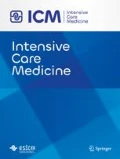Abstract
Objective: To determine the epidemiology of fever on the intensive care unit (ICU). Design: Prospective, observational study. Setting: Nine-bed general ICU in a 500-bed tertiary care inner city institution. Patients: 100 consecutive admissions of 93 patients over a 4-month period between July and October 1996. Interventions: All patients were seen and examined by one investigator within 24 h of ICU admission. Patients were followed up on a daily basis throughout their ICU stay, and all clinical and laboratory data were recorded during the admission. Measurements and results: Fever (core temperature ≥ 38.4 °C) was present in 70 % of admissions, and it was caused by infective and non-infective processes in approximately equal number. Most fevers occurred early in the course of the admission, within the first 1–2 days, and most lasted less than 5 days. The median Acute Physiology and Chronic Health Evaluation (APACHE) II score was 15 ( ± 0.6). The 70 episodes associated with fever at any time were associated with a significantly higher APACHE II score on admission than the afebrile episodes (15.8 ± 6.1 vs 12.1 ± 6.7, p = 0.04). The most common cause of non-infective fever was in the group designated post-operative fever (n = 34). All the patients in the post-operative fever group were febrile on day 0 or day 1; their mean admission APACHE score was 12.4 ( ± 4.4) compared to 15.9 ( ± 7.1) for the remaining patients (p = 0.01). Fever alone was not associated with a higher mortality: 26/70 (37 %) of febrile patients died, compared to 8/30 (27 %) of afebrile patients, (χ 2 = 1.23, p = 0.38). Prolonged fever ( > 5 days) occurred in 16 patients. In 13 cases, fever was due to infection, and in the remaining 3 both infective and non-infective processes occurred concurrently. The mortality in the group with prolonged fever was 62.5 % (10/16) compared to 29.6 % (16/54) in patients with fever of less than 5 days' duration, a highly significant difference (p < 0.0001). Conclusions: Fever is a common event on the intensive care unit. It usually occurs early in the course, is frequently non-infective and is often benign. Prolonged fever is associated with a poor outcome. Post-operative fever is a well-recognised but poorly defined syndrome which requires further study.
Similar content being viewed by others
Author information
Authors and Affiliations
Additional information
Received: 29 December 1998 Final revision received: 16 March 1999 Accepted: 14 April 1999
Rights and permissions
About this article
Cite this article
Circiumaru, B., Baldock, G. & Cohen, J. A prospective study of fever in the intensive care unit. Intensive Care Med 25, 668–673 (1999). https://doi.org/10.1007/s001340050928
Issue Date:
DOI: https://doi.org/10.1007/s001340050928




